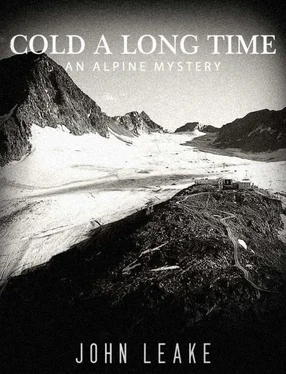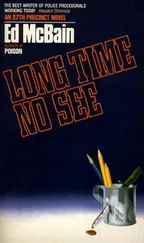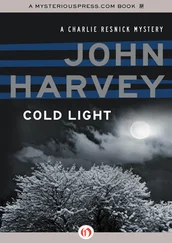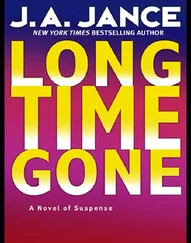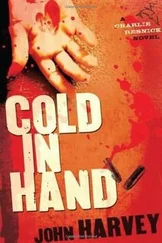They felt a cruel irony the next morning as they exited the Autobahn south of Innsbruck and passed the first police station they’d visited upon their arrival in Austria—a station located only thirty minutes from where Duncan’s car had apparently sat the entire time. Since then they’d spent three weeks crisscrossing the Alps, covering thousands of kilometers.
Just before the turnoff, they noticed a large sign for the Stubai Glacier—a ski resort they’d seen advertised in the Innsbruck Tourist Information office. Far from being a “blind alpine valley,” as Blackstock had described it, the Stubai Valley was a major recreation area on the southwest outskirt of the city. As they entered the valley, they understood why: Its mountainous landscape, decked with a patchwork of woods and meadows, was the most picturesque they’d ever seen—clearly a hiker’s paradise in the summer.
Because Duncan’s car was found outside the Innsbruck city limits, his case was being handled by the gendarmerie. Group Inspector Konrad Klotz was in charge of Duncan’s file; District Inspector Franz Brecher—a so-called “alpine gendarme” from his training as a mountaineer—was doing the legwork of the investigation. At the gendarmerie station in the town of Neustift—the main municipality in the valley—inspectors Klotz and Brecher recounted the investigation so far.
On the evening of September 20, an employee of the Stubai Glacier watched Tyrol Today and realized that he’d seen the missing car parked near the gondola station. He reported it to the Neustift gendarmerie, which sent officers to examine it. Its driver’s side window was slightly cracked open, enabling them to gain access. In the glove compartment they found Duncan’s passport, traveler’s checks, and watch. On the back seat they found his backpack, skates, and a bag of rotten fruit. After taking the passport, they locked the car for the night and called all of the alpine huts around the Stubai Valley to check their registers for Duncan. The next day, September 21, the officers showed his photograph around at all the hotels and huts in the area. No one recognized him, nor was his name on any register.
It appeared that Duncan had set off from the parking lot to go hiking, and then either gotten terribly lost or injured. Maybe he’d taken a bad fall; maybe he’d climbed to a high elevation and been surprised by a sudden storm that caused him to die of hypothermia. Such accidents were common in the Alps, which is why the locals were mindful of cars sitting in the same place for more than a couple of days.
How on earth, Lynda and Bob wanted to know, had Duncan’s car sat in the parking lot of an alpine recreation area for several weeks without being reported? The officers at the Schoenberg station had assured them that abandoned cars in the area were reported as a matter of course. Inspector Brecher replied that nobody had noticed Duncan’s car because it was parked in a huge lot. Later in the conversation he suggested that no one had given it much thought because many visitors left their cars in that lot while they went on long treks.
When the time came to examine Duncan belongings, Lynda and Bob were baffled to see them jumbled together in the back of a police car parked behind the station. Had his possessions been left in his car as he’d left them, they might have yielded a clue about what he’d intended to do. Lynda asked if the police had fingerprinted or photographed the car as they’d found it, and Klotz said no.
“Why not?” Bob asked.
“What for?” said Klotz.
“To find out what happened to our son,” Bob replied. “Maybe someone else has been in his car.” Klotz acknowledged this possibility and agreed to check the car for prints.
That Duncan had left his backpack and a bag of fruit in the car indicated he hadn’t intended to go on a long trek, though it was conceivable that he’d later changed his mind. Another possible clue was a sealed letter addressed to his girlfriend Tara.
“Please open it and read it,” Klotz said. It was dated August 7, the day Duncan had left Nuremberg. He didn’t mention in the letter how he planned to spend his time before departing for Scotland. He was scheduled to fly to Glasgow on August 12, and was thinking Tara should join him in Dundee around August 19. However, he wasn’t sure if Dixon had a clear plan for the team; the deal seemed uncertain. On a minor note, he’d bought a cool pair of Mephisto shoes in Nuremberg.
The shoes weren’t among his things, and the question arose if they were hiking or climbing boots. Lynda called George Pesut, Duncan’s friend in Nuremberg, and asked about them. He said they were a special kind of walking shoe, definitely suitable for a long hike on worn trails, but not for rock climbing.
An audio cassette found in the car bore a sticker from a music shop in Innsbruck, and as they would soon learn, its salesgirl recognized Duncan from his photo. He’d come in sometime before August 15 with another person—a man with dark hair, wearing a nylon club jacket.
From the town of Neustift the MacPhersons drove to the high, southwest end of the Stubai Valley. The road passed through an Arcadian countryside of meadows and grain fields yielding to forest where the slopes of the abutting mountains became too steep for cultivation. Its final stretch wound through dense woods as the valley narrowed, and then opened onto a large clearing covered with empty parking lots. Following a police car, they drove past the lots and then past two hotels near a gondola station.
Between the hotels and the station entrance, parked on the side of the road, they saw what they’d sought for three weeks, though they could scarcely believe their eyes. It was a surreal sight, like a naked man attending church or a pig sitting at a dinner table. Duncan’s red Opel sat all by itself—its rear license plate plainly visible to everyone going to the gondola station.
“There’s no way that no one noticed that car for all these weeks,” Bob said as he parked next to it. Struggling to retain his fury, he reminded the inspectors that he had reported the car missing at the Schoenberg gendarmerie station on September 1, and had clearly expressed his concern that something had happened to Duncan in this very area. Blackstock spoke with Klotz in German, and then explained that the Directorate of the Tyrolean Gendarmerie had apparently taken the notice off the computer system on September 6.
“Why?” asked Bob, dumbfounded. Again Blackstock spoke with Klotz and then turned back to Bob.

Duncan’s red Opel Corsa on September 22, 1989.
“Because it didn’t yield a result,” he said. Another discussion ensued, and while they were standing there, Lynda noticed that she could easily see through the car windows. Duncan’s backpack, sitting on the back seat before the police took it, would have been visible at even a quick glance into the car—an indication that its driver had set off for a mere day hike. Bob inspected the car. It was parked with its rear facing the road, and its front facing the road’s outer edge, which ran along a steep, descending embankment covered with recently-sprouted grass. A wedge-shaped bare spot directly in front of the car indicated that someone had run a seed spreading machine along the edge of the road when no other cars were parked there, and gone around the Opel, which had been in the way. Accounting for germination time, Bob calculated that the car had sat there for at least three weeks.
A helicopter approached, and Blackstock said the police wanted to show them the area into which Duncan had apparently gone hiking. Lynda stayed in the parking lot while Bob and Blackstock went for a tour in the chopper. It was, as the pilot pointed out, a large area of steep rock formations and glaciers. In contrast to the pastoral valley, the surrounding mountains were a harsh terrain, subject to weather that could turn horrid in minutes. Though the pilot didn’t say it explicitly, the message of the tour was clear: In such a wild place, even the fittest young man could easily die.
Читать дальше
